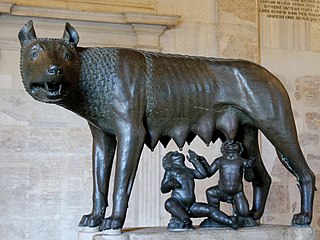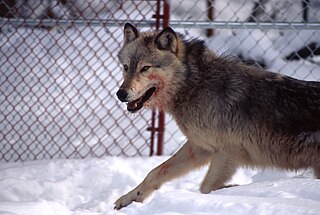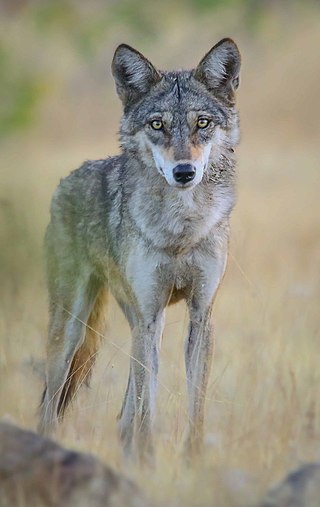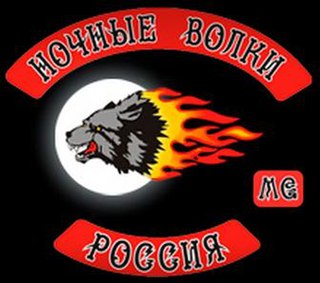
The wolf, also known as the gray wolf or grey wolf, is a large canine native to Eurasia and North America. More than thirty subspecies of Canis lupus have been recognized, including the dog and dingo, though gray wolves, as popularly understood, only comprise naturally-occurring wild subspecies. The wolf is the largest extant member of the family Canidae, and is further distinguished from other Canis species by its less pointed ears and muzzle, as well as a shorter torso and a longer tail. The wolf is nonetheless related closely enough to smaller Canis species, such as the coyote and the golden jackal, to produce fertile hybrids with them. The wolf's fur is usually mottled white, brown, gray, and black, although subspecies in the arctic region may be nearly all white.
Ultranationalism or extreme nationalism is an extreme form of nationalism in which a country asserts or maintains detrimental hegemony, supremacy, or other forms of control over other nations to pursue its specific interests. Ultranationalist entities have been associated with the engagement of political violence even during peacetime. The belief system has also been cited as the inspiration for acts of organized mass murder in the context of international conflicts, with the Cambodian genocide being cited as an example.
Nationalist terrorism is a form of terrorism motivated by a nationalist agenda. Nationalist terrorists seek to form self-determination in some form, which may take the form of gaining greater autonomy, establishing a completely independent sovereign state (separatism), or joining another existing sovereign state with which the nationalists identify (irredentism). Nationalist terrorists often oppose what they consider to be occupying, imperial, or otherwise illegitimate powers.

A wolfdog is a canine produced by the mating of a domestic dog with a gray wolf, eastern wolf, red wolf, or Ethiopian wolf to produce a hybrid.

The Grey Wolves, officially known by the short name Idealist Hearths, is a Turkish far-right political movement and the youth wing of the Nationalist Movement Party (MHP). Commonly described as ultranationalist, neo-fascist, Islamo-nationalist, and racist, the Grey Wolves have been described by some scholars, journalists, and governments as a death squad and a terrorist organization. Its members deny its political nature and claim it to be a cultural and educational foundation, citing its full official name: Idealist Clubs Educational and Cultural Foundation.

Asena is the name of a she-wolf associated with the Gokturk foundation myth. The ancestress of the Göktürks is a she-wolf, mentioned yet unnamed in two different "Wolf Tales". The legend of Asena tells of a young boy who survived a battle; a female wolf finds the injured child and nurses him back to health. The she-wolf, impregnated by the boy, escapes her enemies by crossing the Western Sea to a cave near the Qocho mountains and a city of the Tocharians, giving birth to ten half-wolf, half-human boys. Of these, Yizhi Nishidu becomes their leader and establishes the Ashina clan, which ruled over the Göktürk and other Turkic nomadic empires.

The Nationalist Movement Party is a Turkish far-right, ultranationalist political party. The group is often described as neo-fascist, and has been linked to violent paramilitaries and organized crime groups. Its leader is Devlet Bahçeli.

Wolf hunting is the practice of hunting wolves. Wolves are mainly hunted for sport, for their skins, to protect livestock and, in some rare cases, to protect humans. Wolves have been actively hunted since 8,000 to 10,000 years ago, when they first began to pose a threat to livestock of Neolithic human communities. Historically, the hunting of wolves was a huge capital- and manpower-intensive operation. The threat wolves posed to both livestock and people was considered significant enough to warrant the conscription of whole villages under threat of punishment, despite the disruption of economic activities and reduced taxes. The hunting of gray wolves, while originally actively endorsed in many countries, has become a controversial issue across the globe. Most people see it as cruel, unnecessary and based on misconceptions, while proponents argue that it is vital for the conservation of game herds and as pest control.

The Eurasian wolf, also known as the common wolf, is a subspecies of grey wolf native to Europe and Asia. It was once widespread throughout Eurasia prior to the Middle Ages. Aside from an extensive paleontological record, Indo-European languages typically have several words for "wolf", thus attesting to the animal's abundance and cultural significance. It was held in high regard in Baltic, Celtic, Slavic, Turkic, ancient Greek, Roman, Dacian, and Thracian cultures, whilst having an ambivalent reputation in early Germanic cultures.
The wolf is a large canine native to Eurasia and North America.

The wolf is a common motif in the foundational mythologies and cosmologies of peoples throughout Eurasia and North America, and also plays a role in ancient European cultures. The modern trope of the Big Bad Wolf arises from European folklore. The wolf holds great importance in the cultures and religions of many nomadic peoples, such as those of the Eurasian steppe and North American Plains.

Wolf reintroduction involves the reintroduction of a portion of grey wolves in areas where native wolves have been extirpated. More than 30 subspecies of Canis lupus have been recognized, and grey wolves, as colloquially understood, comprise nondomestic/feral subspecies. Reintroduction is only considered where large tracts of suitable wilderness still exist and where certain prey species are abundant enough to support a predetermined wolf population.

The Indian wolf is a subspecies of gray wolf that ranges from Southwest Asia to the Indian subcontinent. It is intermediate in size between the Himalayan wolf and the Arabian wolf, and lacks the former's luxuriant winter coat due to it living in warmer conditions. Within this subspecies, the "Indian plains wolf" is genetically basal to all other extant Canis lupus apart from the older-lineage Himalayan wolf, with both proposed as separate species. The Indian wolf travels in smaller packs and is less vocal than other variants of the gray wolf, and has a reputation for being cunning. The Indian wolf is one of the most endangered populations of gray wolf in the world.
Turkish mafia is the general term for criminal organizations based in Turkey and/or composed of (former) Turkish citizens. Crime groups with origins in Turkey are active throughout Western Europe and less so in the Middle East. Turkish criminal groups participate in a wide range of criminal activities, internationally the most important being drug trafficking, especially heroin. In the trafficking of heroin they cooperate with Bulgarian mafia groups who transport the heroin further to countries such as Italy. Recently however, Turkish mafia groups have also stepped up in the cocaine trafficking world by directly participating in the massive cocaine smuggling pipeline that runs transnationally from South America to Europe. They allegedly have a lucrative partnership with the Venezuelan drug-trafficking organization known as the Cartel of the Suns who ships them cocaine along with criminal elements from Ecuador. Turkish organized crime has pushed into less traditional cocaine markets as well such as into Eastern Europe, the Caucasus, and the wealthy petro-states of the Persian Gulf. Cosa Nostra and the Turkish mafia are also known to be very close. Criminal activities such as the trafficking of other types of drugs, illegal gambling, human trafficking, prostitution or extortion are committed in Turkey itself as well as European countries with a sizeable Turkish community such as Germany, Netherlands, Belgium, Albania, and the United Kingdom.

The Night Wolves or Night Wolves Motorcycle Club is a Russian motorcycle club that was founded around the Moscow area in 1989. It holds an international status with at least 45 chapters world-wide.

Wolf distribution is the species distribution of the wolf. Originally, wolves occurred in Eurasia above the 12th parallel north and in North America above the 15th parallel north. However, deliberate human persecution has reduced the species' range to about one-third, because of livestock predation and fear of wolf attacks on humans. The species is now extirpated in much of Western Europe, Mexico, and the contiguous United States, and completely from the British Isles and the Japanese archipelago. In modern history, the gray wolf occurs mostly in wilderness and remote areas, particularly in Canada, Alaska, the Northern United States, Europe and Asia from about the 75th parallel north to the 12th parallel north. Wolf population declines have been arrested since the 1970s, and have fostered recolonization and reintroduction in parts of its former range, due to legal protection, changes in land-use and rural human population shifts to cities. Competition with humans for livestock and game species, concerns over the danger posed by wolves to people, and habitat fragmentation pose a continued threat to the species. Despite these threats, because of the gray wolf's relatively widespread range and stable population, it is classified as Least Concern on the IUCN Red List. In Africa the population of wolves is limited to the northern regions with the African golden wolf north of the Sahara and the Ethiopian wolf in Ethiopia.

The wolf salute, the grey wolf salute or the grey wolf gesture, symbolizes Turkish nationalism, Islam, or Pan-Turkism in Turkey. It is a political symbol used by the Grey Wolves and the Nationalist Movement Party. According to Alparslan Türkeş's first interpretation, it symbolizes Turkishness and Islam. It is considered a controversial gesture. In this context, its usage has been interpreted differently, and due to its use by groups defined as far-right, it has been banned in some countries such as France and Austria.
The relationship between Islam and nationalism, from the beginnings of Islam until today, has often been tense, with both Islam and nationalism generally opposing each other.












